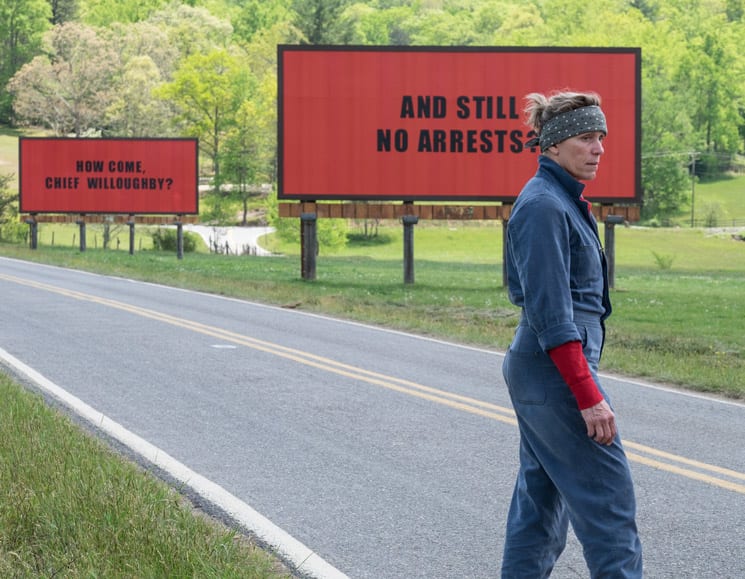Over the past decade, British/Irish playwright-turned-filmmaker Martin McDonagh has shown he can milk levity out of even the darkest subjects with his jet-black crime comedies (2008's In Bruges, 2012's Seven Psychopaths), but he's outdone himself with his latest film, Three Billboards Outside Ebbing, Missouri. McDonagh's latest is a violent, visceral drama that sets itself up as a rape revenge thriller, but really acts as a ferocious meditation on police accountability, racism, sexism and the patriarchal confines of rural America.
Frances McDormand plays Mildred Hayes, a grieving mother who, fed up with local law enforcement's inability to capture the man/men who raped and mutilated her teenage daughter seven months ago, decides to rent three billboards on the outskirts of her small town. What she plasters there are these words: "Still No Arrests?" "How Come, Chief Willoughby?" And "Raped While Dying."
That gets the attention of the local media and police force — namely Willoughby (played by Woody Harrelson) and Officer Dixon (Sam Rockwell). But as we, and Mildred, get to know them, it becomes clear that things aren't so black and white.
That doesn't stop the town's frustrations from boiling over, as local businessmen are thrown out of second-story windows, dentists have their thumbs drilled in and streets are set ablaze in Mildred's quest to light a fire under the detectives assigned to her daughter's case.
Early on in his film career, McDonagh garnered comparisons to fellow foul-mouthed filmmaker Quentin Tarantino, but Three Billboards is more Coen Brothers-esque than anything, what with its decision to cast McDormand as its lead, tense, small town action similar to Blood Simple and the ways McDonagh lays out the facts and revels in the onscreen absurdity.
By film's end, not much of a resolution has been made. But if the recent success of movies like Get Out, Oscar-winner Moonlight and Wind River are any indication, today's audiences need movies that reflect America's growing social divide now more than ever. Three Billboards Outside Ebbing, Missouri doesn't have all the answers, but it gets the feeling exactly right.
(Searchlight Pictures)Frances McDormand plays Mildred Hayes, a grieving mother who, fed up with local law enforcement's inability to capture the man/men who raped and mutilated her teenage daughter seven months ago, decides to rent three billboards on the outskirts of her small town. What she plasters there are these words: "Still No Arrests?" "How Come, Chief Willoughby?" And "Raped While Dying."
That gets the attention of the local media and police force — namely Willoughby (played by Woody Harrelson) and Officer Dixon (Sam Rockwell). But as we, and Mildred, get to know them, it becomes clear that things aren't so black and white.
That doesn't stop the town's frustrations from boiling over, as local businessmen are thrown out of second-story windows, dentists have their thumbs drilled in and streets are set ablaze in Mildred's quest to light a fire under the detectives assigned to her daughter's case.
Early on in his film career, McDonagh garnered comparisons to fellow foul-mouthed filmmaker Quentin Tarantino, but Three Billboards is more Coen Brothers-esque than anything, what with its decision to cast McDormand as its lead, tense, small town action similar to Blood Simple and the ways McDonagh lays out the facts and revels in the onscreen absurdity.
By film's end, not much of a resolution has been made. But if the recent success of movies like Get Out, Oscar-winner Moonlight and Wind River are any indication, today's audiences need movies that reflect America's growing social divide now more than ever. Three Billboards Outside Ebbing, Missouri doesn't have all the answers, but it gets the feeling exactly right.




